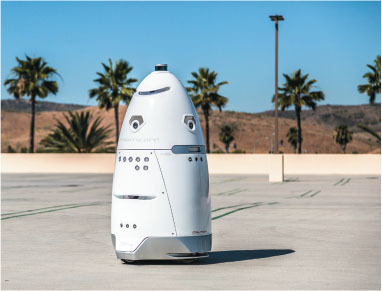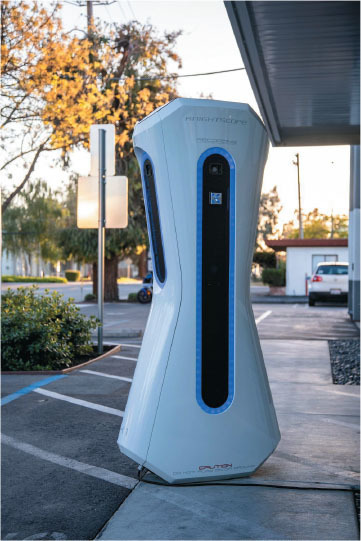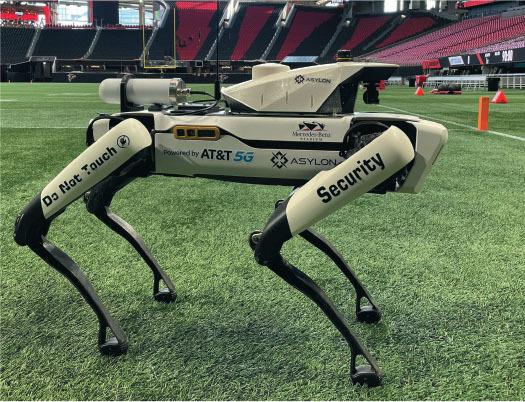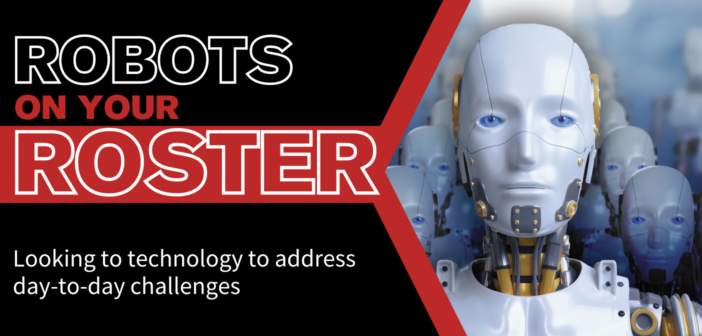Looking to technology to address day-to-day challenges
The short robot on wheels will never call out sick or complain about patrolling a hotel parking lot amid a summer heatwave. Likewise, the strikingly human-like robot will never need a bathroom break or get tired of answering the same questions repeatedly.
The next generation of robots, powered by artificial intelligence, offers a glimpse into the hospitality industry’s future. Along with AI-powered smartphone apps and chatbots, these robots promise to significantly reduce the manpower needed for hotel operations, though they risk alienating guests who still prefer service with a human smile. More on that later.
This past September featured several major developments for robots in the hospitality industry. The first came when PENN Entertainment announced it would deploy Knightscope’s K5 autonomous security robots at 43 of its properties, which include casinos, racetracks, and hotels. That decision followed testing periods at several PENN properties, including the M Resort Spa Casino in Las Vegas.
The second big development also took place in the entertainment capital of the world. The Sphere, a $2.3 billion entertainment venue that opened September 29, unveiled its Aura humanoid robots, which are capable of interacting with guests and answering their questions about the facility.
Facing a prolonged labor shortage, many tech-savvy hoteliers surely have considered adding robot butlers to bring room service and fresh towels to guests. But the newest robots are capable of much more than that. Equipped with machine-learning and facial-recognition technology, they can help hotels and entertainment venues provide a safer environment for guests and a more-personalized level of service.
4 Hotel Tech Trends For 2024
The K5’s high-definition cameras can record incidents and allow hotel workers to see and hear what’s happening on the property in real time. The robot also can read license plates and alert security professionals when unauthorized vehicles enter the parking lot.

Similar robots are providing security at malls, sporting venues, hospitals, and universities. At Mercedes-Benz Stadium, for example, Benzie the DroneDog, developed by Boston Dynamics and Asylon Robotics, patrols the 11-acre home of the Atlanta Falcons and Atlanta United FC. The robot can read license plates, recognize faces, detect narcotics and explosives, and send real-time video back to security personnel.
Knightscope said its stationary K1 Tower robot uses facial-recognition technology to benefit casinos in several ways. It recognizes players who’ve been banned for bad behavior, along with people who are trying to quit gambling and have signed up for voluntary exclusion, helping casinos fulfill regulatory requirements.
The robot also can identify VIPs and members of loyalty clubs, enabling hotels to cater to their best customers. When a rewards member enters the hotel, for instance, the robot can send an alert to workers’ smart devices with information about that customer’s preferences.
In theory, a bartender could use that information to greet a VIP customer with his favorite drink as soon as the patron sits down. Alternatively, when a guest leaves the hotel, the robot could send a message stating that the room is ready for housekeeping.
On the Las Vegas Strip, many hotels have security guards checking hotel room keys when guests head from the casino floor to the hotel elevators. Robots eventually could streamline that process and reduce the headcount needed for security.

Knightscope’s K5 autonomous security robots, coming soon to a property near you?
Other hospitality robots aren’t quite that smart, but they still can prove invaluable to understaffed hotels. A number of manufacturers, including Aethon, Bear Robotics, Blue Pin, CTRL Robotics, Keenon Robotics, and RobotLAB, are producing robots that can deliver items to hotel guests, sanitize rooms, and handle luggage.
Robot butlers have yet to gain widespread adoption in U.S. hotels, but that may change as competition among manufacturers leads to lower prices, according to Dr. Mehmet Erdem, professor of hotel operations and technology at UNLV’s William F. Harrah College of Hospitality. Robots eventually may reduce labor costs for hotels, but many leisure travelers might become dissatisfied with the guest experience, he said.
“When everything is automated, it’s almost like getting your hotel experience out of a vending machine,” Erdem said. “If you’re an on-the-go businessperson, it works, but for other guests, the experience is very different.”

HOW MUCH IS TOO MUCH?
Hoteliers are in a difficult spot when it comes to technology, Erdem said. On the one hand, they must continue their technological investments to keep up with their competitors and with the technology guests are enjoying in their homes. On the other hand, new technology is costly, and if it’s not reliable and user-friendly, it can frustrate guests and lead to poor guest-satisfaction scores, he said.
“Hoteliers are asking themselves, ‘Do we need all this technology for a customizable experience? How much is too much?’” Erdem said. “If you don’t adopt new technology, some of your competitors will. When you stay at a hotel, you expect the technology to be at least as good as what you have at home, and if it’s not, that’s disappointing. By the time that shows up in your online reviews, you’re way behind the curve.”
In a feature for The New York Times in July, freelance journalist Amy Tara Koch bemoaned the unrelenting advance of in-room hotel technology, saying it threatened to ruin her guest experience. On recent trips, motorized drapes, voice-activated lights, smart mirrors in the bathroom, and QR codes on the smart TV all required some time to get used to or failed to work, she said.
Speaking with Today’s Hotelier, she reiterated that new hotel technology often feels unnecessary at best and burdensome at worst.
“I think a lot of hotel brands feel they have to be perceived as modern, contemporary, and cool by implementing all of this technology like chatbots, smart TVs, and apps, but the truth is it’s confusing to people, especially leisure travelers,” Koch said. “People want to relax in their hotel room, and there seems to be a learning curve for every single piece of technology in the room.”

The Knightscope K1 Tower robot is currently employed primarily in casinos or on properties where facial recognition is crucial.
“You had a bunch of options to choose from, but most of the people I interviewed for my story just wanted the lights on or off,” she said. “They don’t want a nightlight or mood lighting.”
For her article, Koch interviewed Neha Jaitpal, the global general manager for Honeywell’s Building Technologies division, which provides tech solutions for more than two million hotel rooms worldwide. Jaitpal said automation is allowing hotels to cater to guests’ individual preferences without the need for human interaction.
As an example, Jaitpal said guests now can arrive at their hotel rooms to find the temperature, lighting, and television programming set precisely how they want. But if that requires guests to sync their smartphones to every device in the room by Bluetooth, Koch said she’ll pass.
“Maybe it’s a generational thing, but I don’t need to turn everything on and off with my phone,” she said.
Similarly, Koch expressed frustration with hotel chatbots that are designed to replace human concierges. Through text messaging or smartphone apps, chatbots can be used to request car services, make restaurant reservations or spa appointments, send maintenance requests, obtain information about hotel amenities, request fresh towels and toiletries, or get recommendations for nearby attractions.

Benzie the Drone Dog, developed by Boston Dynamics and Asylon Robotics, patrols Mercedes-Benz Stadium in Atlanta to read license plates, perform facial recognition, and detect dangerous substances. IMAGE COURTESY OF MERCEDES-BENZ STADIUM
But unless guests’ requests are simple and generic, chatbots’ responses may not be helpful, Koch said. Ask a hotel chatbot about the best local restaurants, and it likely will provide the same list to all guests, regardless of their demographics and preferences, she said.
In contrast, Koch said she recently asked a concierge at a Paris hotel to recommend a quiet bar that wouldn’t be flooded with tourists, and he knew the perfect place.
“He took the time to listen to me, and his expertise really benefited me,” Koch said. “You can’t get that from an app. It seems to be the default for hotels to tell you to download their app, and I find that frustrating. Sometimes I want real, genuine, old-fashioned customer service.”
TIME KEEPS ON TICKIN’
UNLV’s Erdem, a content advisor for Hospitality Technology magazine, said check-in kiosks have gained widespread adoption at Las Vegas hotels, and some properties, such as Park MGM, have removed their front desks entirely. At those properties, so-called lobby ambassadors are available to help guests who struggle to use the self-service kiosks, but the total headcount has been reduced, he said.
In guest rooms, more functions are being moved onto smart TVs, smart mirrors, and other digital displays, Erdem said. Guests can order room service, chat with the front desk, request items, open the curtains, turn off the lights, and control the TV using these devices, which now frequently offer touchscreen functionality instead of a remote control with buttons to push, he added.
Looking ahead, Erdem said several companies are exploring ways to use smartphone data to drive revenue and improve the guest experience. When a customer accesses the hotel’s Wi-Fi, an AI program will track his phone’s location throughout the property, noting whether he spends a lot of time at the Starbucks, the restaurant, or the spa.

Pepper, the four-foot-tall humanoid robot, can answer guest questions and never gets frustrated with the same queries. IMAGE COURTESY OF MANDARIN ORIENTAL HOTEL GROUP
Using that data, hotels will be able to offer promotions tailored to individual customers, steering them back toward their favorite amenities or incentivizing them to try new ones, Erdem said. AI will make it easier for hotels to gauge the effectiveness of their promotions by automating the tracking of coupons and offers to determine usage rates.
“They know where that particular device that’s associated with you is on their property, which gives them more data points to work with,” he said. “The more information you have on your guests, the more customized you can make it for them, especially when they return the next time.”
AI also will improve security at hotel properties, Erdem said. Several AI companies are researching how to use facial-recognition and behavioral cues to determine a person’s mood, which could help hotels and casinos to identify potential threats. In addition, companies are exploring how AI can monitor many surveillance cameras at once, searching for suspicious behavior much more efficiently than human security professionals.
In time, AI-powered surveillance systems will be able to identify emergencies, such as when a fight breaks out or a guest falls to the ground due to a health event and will automatically send an alert to security guards. AI could even help hotels to identify signs of human trafficking based on movement on the property.
“In terms of safety and security, AI has a lot of positive implications,” Erdem said.




